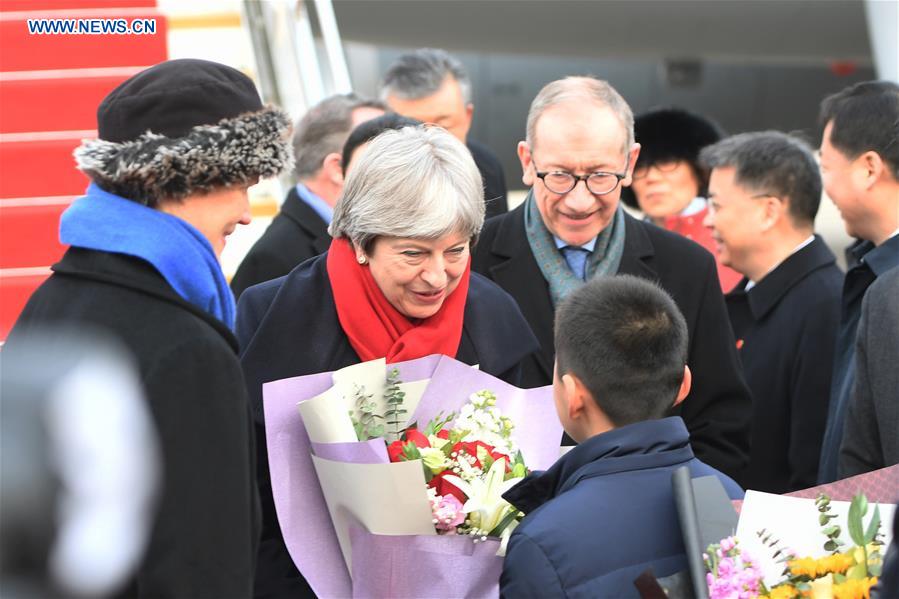Time to shine "Golden Era" for China-Britain ties brighter
- Jin Jing, Gu Zhenqiu
 0 Comment(s)
0 Comment(s) Print
Print E-mail Xinhua, 02 01, 2018
E-mail Xinhua, 02 01, 2018

British Prime Minister Theresa May arrives in Wuhan, central China's Hubei Province, Jan. 31, 2018. Theresa May is scheduled to visit China from Jan. 31 to Feb. 2. (Xinhua/Xiao Yijiu)
by Xinhua writers Jin Jing, Gu Zhenqiu
LONDON, Jan. 31 (Xinhua) -- Rarely is an official visit by a British prime minister to China so much anticipated after reported delays since early last year thanks to major uncertainties at home. Now it's real.
After a year of general election, cabinet reshuffle, tough and still ongoing Brexit negotiations, British Prime Minister Theresa May Wednesday kicked off her first official visit to China since taking office in 2016.
The three-day visit is also the first by a British prime minister to China since Chinese President Xi Jinping's tour to Britain in October 2015 when both sides agreed to embrace a "Golden Era" for bilateral relations.
May's trip shortly follows French President Emmanuel Macron's state visit to China earlier this month. That shows both sides are eager to improve their ties in a time of rising global challenges and uncertainties.
To mitigate the impact of a potential Brexit cliff edge, Britain is under immense pressure to consolidate bilateral trade relations beyond Europe.
Britain is China's second largest trading partner within the European Union(EU) and China is Britain's second largest non-EU trading partner. With trade volume between the two countries hitting 79 billion U.S. dollars in 2017, China is one of the countries Britain hopes to sign a free trade pact with once it leaves the EU in March 2019.
As Washington rolls out more measures with strong smell of protectionism, Beijing-London ties have a chance to hit a new high as both sides remain committed to free trade and globalization.
Better still, with a "liberating effect" of Brexit, Britain could look beyond its traditional partnerships with the EU and United States, and look at China as a partner with exciting new possibilities.
In a major outcome reached at the recent China-UK Economic and Financial Dialogue, the two are proposing a bilateral investment fund with the first round of 1.3 billion dollars to create jobs, promote trade and support the China-proposed Belt and Road Initiative.
The two countries also plan to step up practical cooperation in such fields as nuclear technology, high-speed train, energy, aerospace and artificial intelligence, among others.
The China-Britain relationship has been considered an exemplar for China-West ties in terms of putting aside differences and seeking the largest possible common ground.
Britain is the first major Western country to join the China-proposed Asian Infrastructure Investment Bank as a founding member.
The landmark Hinkley Point C nuclear project, with one-third investments from a Chinese company, is expected to power 6 million homes by 2025, creating 25,000 jobs during construction and 900 permanent positions throughout the station's 60-year life.
The Chinese naval escort fleet's visit to Canary Wharf, literally the heart of London in October last year for the first time in history, is another sign of enhanced mutual trust between the two countries.
May's China trip, with a forward-looking spirit, can help usher in a new phase of "Golden Era." A strong China-Britain relationship not only serves the interests of both countries, but also sends a strong and vital message across the world that open and free trade still prevails.
However, trust is hard earned and can be lost quite easily.China-Britain ties went through a testy period when May, shortly after becoming prime minister in 2016, delayed approving Hinkley Point C project, citing "security concerns" about China's investment. Such unfounded stroke of "China-phobia" is detrimental not only to China-Britain relations, but the British leader's much trumpeted image of a "Global Britain."
Strong bilateral ties, like any other relations, need steady mutual trust and a long-term vision.
"The golden age is before us, not behind us," William Shakespeare's words can't be more accurate at this critical time. A "Golden Era" for China-Britain ties need to be polished and nourished to remain shiny and become even brighter.


